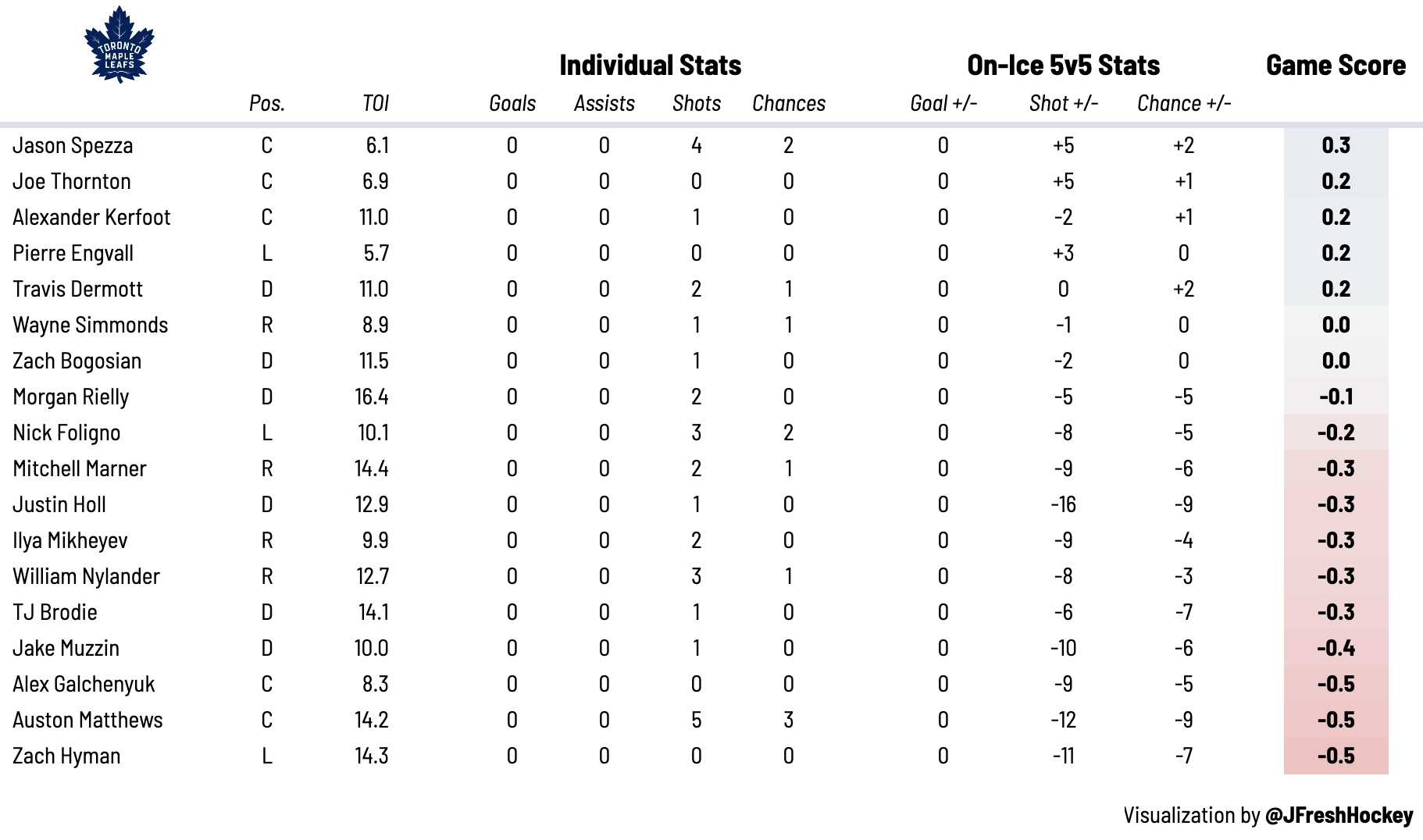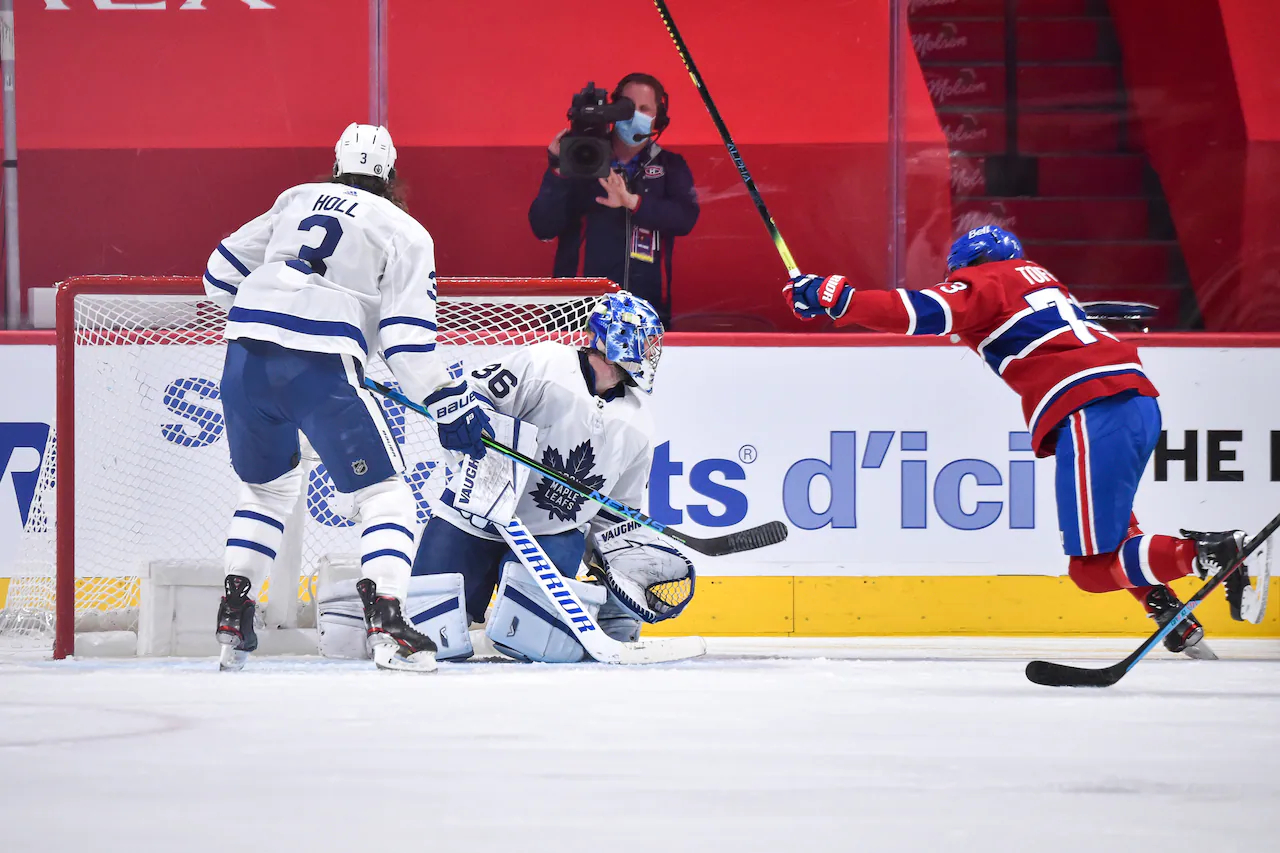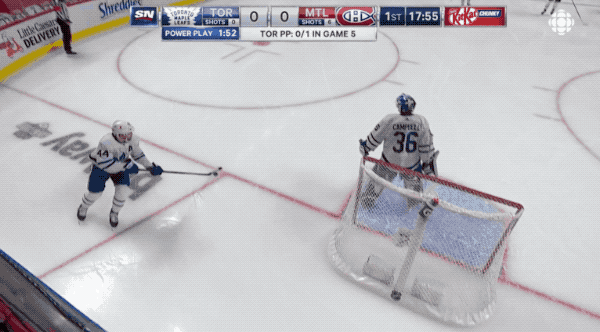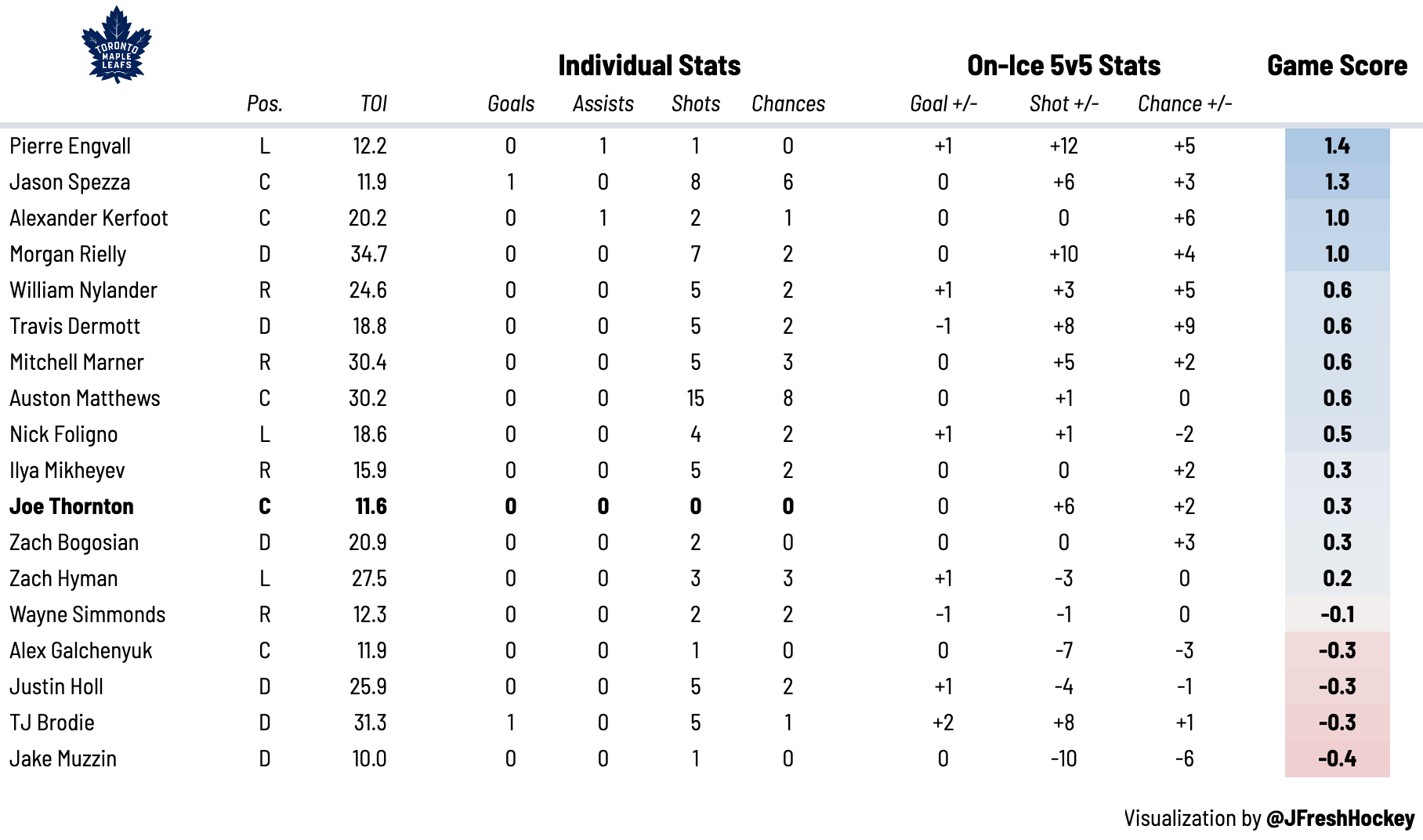My goal is always to remain objective with these postgame evaluations, but there’s something about the emotional aspect of last night that got to me.
Maybe it was the 2,500 fans in attendance that might as well have been 25,000 considering it’s been 14.5 months since we had a live sporting event in Canada.
Maybe it’s the fact that the Toronto Maple Leafs have gone 0-7 in the playoffs when their opponents are facing elimination. Maybe it’s just variance in a sport that will never make sense to me despite all the hours I pour into trying my best to understand it.
Watching Auston Matthews on the bench, I tend to have the same reaction. “Is this team cursed?” At this point, I’m prepared to believe anything. Frankly, I don’t really know what to say after watching the Leafs lose 3-2 in overtime to the Canadiens in a game that they probably should’ve lost earlier.
I never want to be “narrative” guy. I lean into all the nerd jokes about myself because at least people are making fun of me for basing my opinions on evidence — or graphs — instead of emotion, but I’m feeling the emotions right now. I can guarantee you the Leafs are, too.
What do we make of Game 6? How are we feeling right now? Where does this team even go from here?
In another painful addition of Leafs postseason analysis, we’ll try our best to rationally break down the game and some of its nuances, but I make no promises this time around.
Let’s just get this over with.
Noteworthy Performances
I’d like to start by saying there’s no chance this game even gets to overtime without Jack Campbell standing on his head. The energy from Habs fans was electric, as expected, with Montreal feeding off that energy en route to a dominant first period.
Campbell was forced to make ten-bell saves on high-percentage chances originating from below the goal line; a Shea Weber shorthanded slapshot; a Nick Suzuki breakaway; Eric Staal firing a wrister top-corner through a screen; Tyler Toffoli on a 3-on-1 rush; Philip Danault in the middle of the slot.
The list goes on.
The expected goals indicated that Montreal should’ve beat Campbell twice in the first 20 minutes. He shut them out in that time frame, giving his team a chance to climb back, which they promptly squandered by playing another dud of a period. It wasn’t until the final nine minutes of the third period where a few bounces got them back in the game.
Again, I hate being a Negative Nancy, but it’s time to acknowledge the team’s two highest-paid (active) players. Auston Matthews and Mitch Marner failed to produce again in Game 6. Neither player has looked particularly dangerous recently, despite some of the chances Matthews was generating earlier in the series.
These are obviously two world-class players, which is what makes their absence in these big moments so disappointing. What I find crazy is that when you go back and look at the scoresheet, Matthews fired 15 pucks towards the net, eight of them from the slot.
Statistically speaking, I don’t expect Matthews to keep shooting zero percent of those.
Auston Matthews and Mitch Marner have scored one goal on a combined 59 shots in the series.
That’s a 1.7 shooting percentage.
During the regular season, they scored 61 goals on a combined 378 shots, or 16.1 percent.
— Scott Wheeler (@scottcwheeler) May 30, 2021
Realistically speaking, I just want to see them put the ****ing puck in the net.
Sheldon Keefe mentioned before the game that a lot of these haven’t been “clean looks”, but at some point, these pucks have got to go in, right? That’s what I kept telling myself in 2020 when the Leafs shot two percent at 5v5 against the Columbus Blue Jackets.
Shooting percentage is a fickle mistress. Regression to the mean is a real thing, which is why I try to not get too high or low after a small sample disaster like Saturday night, but in the moment, I can understand the frustration. It’s the same anger I express when I watch Mitch Marner get another chance from in tight and fail to capitalize.
You want him and Matthews to keep out-chancing the Canadiens at 5v5, which they’ve accomplished all series. The expected goals should be 6-3 Toronto right now when their top line is on the ice. Instead, it’s 3-0 Leafs, so both goaltenders are coming up huge, but the top line is still outplaying its matchup at even strength.
Watching Matthews and Marner fail to produce in key moments is disheartening, but I’d feel much worse if they were getting outplayed at even strength. The good news is the latter isn’t a problem. The bad news is they have a one-game sample to change the narrative on themselves, which hasn’t exactly gone well in years past.
We’ll touch on the power play later, but while we’re breaking down individual performances, it’s worth noting that Morgan Rielly was the only Leaf contributing to offense in the first 40 minutes of this game. He had a similar Game 6 against Boston in a closeout situation back in 2019, playing some of the best hockey of his life, activating into the play and completing dangerous passes through the middle of the ice.
It would have been nice if some of his teammates followed suit. Shockingly, it was his defense partner who ended up making a major impact offensively. TJ Brodie was often the one jumping up into the play on Saturday night, acting as a fourth forward when the Leafs were trailing. His efforts paid off, with a point shot redirecting off of Jeff Petry and in, which at least gave the Habs defenseman some contribution to offense in this series.
While we’re on the topic of defenseman, Jake Muzzin left the game early with an injury that looked like it could sideline him for a while. As best as Travis Dermott tried to fill his shoes, the inherent risk in his game resulted in an overtime turnover through the middle of the ice, not dissimilar to Alex Galchenyuk‘s in Game 5.
What’s funny is Galchenyuk tried the exact same pass in Game 6 that burned him the previous game. He got away with it this time around, but Dermott didn’t, turning the puck over in his own end, leading to the game-winner. I’m sure you’ve all seen it by now so I won’t bother breaking it down in more detail.
Instead, we’ll discuss something much more painful.
Toronto’s Power Play
Coming into the playoffs, this was the biggest area of concern for the Leafs. There is any number of statistics you could pull up to prove its lack of success. My personal favourite is that in the final 29 games of the season, Toronto scored five goals on the power play while allowing five shorthanded goals.
They had a goal differential of zero — with the man advantage.
Fast-forward to 17:41 remaining in the third period, tie game in Game 6 against the Habs, by far the most high-leverage moment of the season for the Leafs. They still have Joe Thornton on PP1, in the bumper spot.
What’s the point of spending so much money on an analytics department, coaching staff, and overall organization if you’re going to be playing your least threatening shooter in the middle of your 1-3-1 PP when your season is on the line?
I’ll give Toronto credit for moving Thornton to the net front on their next power play in the third period, which is a much better use of his skill set as a passer and someone who can make plays behind the net if the puck gets rimmed around to him. On the other hand, I find myself asking, “What if it was Mike Babcock making these decisions?”
Then I’ll re-watch the power play and realize the actual problem is #34 failing to make simple plays on the 5v4 breakout.
This is one isolated play, but it’s emblematic of the larger problem. Matthews has failed to gain the zone efficiently against Montreal’s penalty kill all series, especially in Game 6. We know he has the combination of size and puck skills that should allow him to slice through the neutral zone like Jaromir Jagr in his prime, but for some reason, Matthews has failed to accomplish that.
In a lot of ways, the 5v4 zone entry in hockey is analogous to a late-game possession in basketball; you pass it to your best player and ask them to solve the defense. When they fail to do that, it falls on their shoulders, which has been the most frustrating part of Toronto’s PP entries involving Matthews and Marner this year.
They seem to have more efficiency when William Nylander is playing a larger role in the 5v4 entry scheme. This shouldn’t come as a surprise, considering he’s been Toronto’s most dangerous player off the rush in this series. Unsurprisingly, the Leafs had much more success on the power play when Nylander was getting more touches on the flanks as a shot threat, putting pressure on the defense that opened up passing lanes through the middle of the ice.
Is any of this new? No. Is any of it surprising? Not really. That’s what makes it so infuriating when you watch Matthews, Marner or Rielly slowly carry the puck up the ice and fail to gain the zone on the power play. It’s been a problem for a while now.
40 Minutes of Torture
Trying to compartmentalize things here, let’s take a look at the 5v5 scoring chances by period.
- 1st period: 13-7 Montreal
- 2nd period: 7-2 Montreal
- 3rd period: 8-1 Toronto
- Overtime: 13-3 Toronto
There are two different ways you could look at that. A) The Leafs got drastically outplayed in the first 40 minutes of a closeout playoff game, or B) They found a way to force overtime with their backs up against the wall and probably deserved a better fate in the extra frame.
Both of those things can be true.
I’m sure most Leafs fans are feeling a lot of A) today. I find myself in a similar boat, especially when you factor in the rush chances, which were 7-1 Canadiens in the first two periods. After score effects kicked in, Toronto was able to mount a bit of a comeback. They deserve some credit for that.
They also deserve credit for falling behind in the first place, which weirdly, didn’t happen until the third period. We won’t bother going into a slow-motion replay of the goaltender interference challenge that cost Toronto an additional penalty, or the Marner puck-over-glass penalty a few seconds later leading to a prolonged 5-on-3 for Montreal.
Of course that had to happen. The hockey gods wouldn’t have it any other way.
One thing I will say is that the average NHL power play is about 20 percent, so if you’re 20 percent sure the challenge will get reversed, it’s the right decision. Montreal’s power play has been historically below average, so we could probably trim that closer to 15 percent.
Knowing what we know about goaltender interference challenges, there’s so much inherent randomness to it that I genuinely think that might have been the right call even though I was watching it in real-time thinking, “There’s no way this gets reversed, right?” If Campbell made more of an effort to slide back in his crease, he probably gets the call, but we both know it didn’t go down like that.
Onto Game 7.
What does this game mean?
Again, this isn’t my domain. I’m the expected goals nerd who tells you which team “deserved” to win based on the 5v5 shots and chances. By the way, that’s been Toronto in every game this series.
xG for this series. 👀@HockeyAnalytics
#GoHabsGo #GoLeafsGo @NHL @DomGalamini #womenintech #stathletes pic.twitter.com/ayyOKUyjIC
— Meghan Chayka (@MeghanChayka) May 29, 2021
The exception to that was Game 6.
The Deserve-To-Win’Ometer on Moneypuck.com swung heavily in Montreal’s favour for the majority of the game, which again, I know nobody wants to hear. This is the time of year when everyone’s looking for passion, grit, tenacity, or insert any other number of tropes.
Frankly, I’m just looking for the team to play better after two periods.
 Toronto’s bottom six and bottom pair managed to hold themselves above water, with the rest of the team getting hemmed in their own end for long stretches. After controlling the puck in the third period and a large portion of overtime, the final tallies look better, but I thought it was worth sharing the above image for context.
Toronto’s bottom six and bottom pair managed to hold themselves above water, with the rest of the team getting hemmed in their own end for long stretches. After controlling the puck in the third period and a large portion of overtime, the final tallies look better, but I thought it was worth sharing the above image for context.
Here’s what things looked like after 75 minutes of hockey.
That looks a bit better, but I wanted to use this opportunity to point out Thornton’s zero shot attempts. He’s never been a high-volume shooter, always looking for the pass instead. Still, something to me stands out about those goose eggs on the stat sheet when every other player on the team registered a shot attempt.
This is the same player the Leafs have refused to take out of the lineup despite his on-ice play calling for it at multiple times this season. Instead, they have him on PP1 in the highest leverage minutes of the season. I’d love for someone to rationally explain to me why they keep doing this.
I don’t do well with irrationality. That’s never been my strength in this public domain when I’m evaluating hockey, which is why I try to fall back on my ability to break down video and statistics before arriving at any serious conclusions. I’ve done all that and I still can’t help but be swayed by my emotions after watching…that.
Maybe that’s what Game 6 “meant” more than anything. The emotional reminder to Leafs fans of everything that’s gone wrong in years past, along with the same PP frustrations that have bothered you for months. None of this is new. You’ve felt this before and I can all but guarantee you’ll feel it again.
I just hope the team finally decides to win a Game 7 so we don’t have to start the next chapter of this conversation.



































